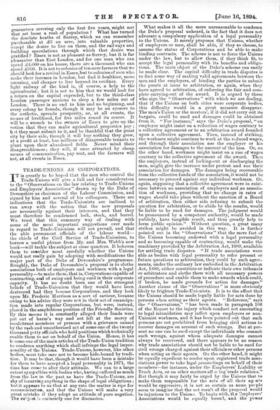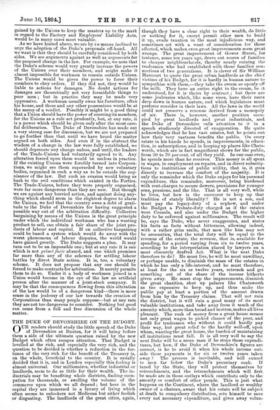TRADE-ITNIONS AS CORPORATIONS.
JT is greatly to be hoped that the men who control the Trade-Unions will give a full and fair consideration to the "Observations on the law relating to Trade-Unions and Employers' Associations" drawn up by the Duke of Devonshire as chairman of the Labour Commission, and signed by him and several of his colleagues. There are indications that the Trade-Unionists are in,clined to run away with the notion that the new proposals are necessarily against their interests, and that they must therefore be condemned lock, stock, and barrel. We trust that this summary way of dealing with some of the most important suggestions ever made in regard to Trade-Unionism will not prevail, and that the able permanent . officials of the labour world— the chiefs of the Civil Service of Trade-Unionism, to borrow a useful phrase from Mr. and Mrs. Webb's new book—will tackle the subject at close quarters. It behoves them to consider most carefully whether the Unions would not really gain by adopting with modifications the major part of the Duke of Devonshire's programme. Roughly, the Duke of Devonshire's proposal is to clothe associations both of employers and workmen with a legal personality—to make them, that is, Corporations capable of contracting, and of suing and being sued in their corporate capacity. It has no doubt been one of the strongest beliefs of Trade-Unionism that they would have been destroyed had they become Corporations, and they look upon Mr. Frederic Harrison as a sort of saviour, because owing to his advice they were not in their act of emancipa- tion made into regular Corporations, but were, instead, placed in the amphibious position of the Friendly Societies. By this means it is constantly alleged their funds were put out of harm's way and not left at the mercy of recalcitrant members or persons with a grievance caused by the rash and unauthorised act of some one of the twenty thousand petty offi3ials who hold positions which technically enable them to aet on behalf of the Union. Hence, it has b 'come one of the main articles of the Trade-Union tradition to condemn anything which shall infringe the legal imper- sonality ef the Unions. Trade-Unions, however, like other bodies, must take care not to become hide-bound by tradi- tion. It may be that, though it would have been a mistake for them to have accepted a legal personality in 1871, the -time has come to alter their attitude. We can to a large extent sympathise with bodies who, having suffered so much from the law in the past as have the Trade-Unions, are shy of incurring anything in the shape of legal obligations ; but it appears to us that at any rate the matter is ripe for reconsideration, and that the Unions will make a very great mistake if they adopt an attitude of pure negation. The s&jot is eminently one for discussion. What makes it all the more unreasonable to condemn the Duke's proposal unheard, is the fact that it does not advocate a compulsory application of a legal personality to the Unions. It merely proposes that Unions, whether of employers or men shall be able, if they so choose, to assume the status of Corporations and be able to make binding contracts. The scheme is not to force the -Unions under the law, but to allow them, if they think fit, to accept the legal personality with its benefits and obliga- tions. The main object of the Duke's scheme can easily be made clear. The capital difficulty in trade disputes is to find some way of making valid agreements between the men and the employers, of binding the parties to submit the points at issue to arbitration, or again, when they have agreed to arbitration, of enforcing the fair and com- plete carrying-out of the award. It is argued by those who sign the " Observations " with which we are dealing, that if the Unions on both sides were corporate bodies, this difficulty would in a great measure disappear. The men's Union or the masters', if it did not carry out its bargain, could be sued and damages could be obtained from it. "For instance," says the Duke's proposal, "an employer might insist on a reduction of wages contrary to a collective agreement or to an arbitration award founded upon a collective agreement. Then, instead of striking, the workmen might continue to work at the reduced wages, and through their association sue the employer or his association for damages to the amount of the loss. Or, on the other hand, workmen might insist on a rise of wages contrary to the collective agreement of the award. Then the employers, instead of locking-out or discharging the men, might give the increase under protest and sue their association for damages. The damages being recoverable from the collective funds of the association, it would not be necessary to proceed against any individual workman. Or, again, supposing that a collective agreement were in exist- ence between an association of employers and an associa- tion of workmen, providing that no change in rates of wages should take place without the sanction of a Board of arbitration, then either side refusing to submit the question for arbitration, or to abide by the results, would be liable to be sued for damages. The judgment would be pronounced by a competent authority, would be made publicly, have tangible result, and thus greatly help to form public opinion." Without question, a great many strikes might be avoided in this way. It is further pointed out in the " Observations " that the mere fact of the Unions becoming endowed with a legal personality and so becoming capable of contracting, would make the machinery provided by the Arbitration Act, 1889, available for settling trade disputes. "If trade associations were able as bodies with legal personality to refer present or future questions to arbitration, they could by such agree- ments, under the ordinary law embodied in the Arbitration Act, 1889, either constitute or indicate their own tribunals or arbitrators and clothe them with all necessary powers of procedure and enable them to make awards which could, if broken, be made grounds for action for damages." Another clause of the " Observations" is more obviously likely to frighten Trade-Unionists. It is to the effect that the Unions should be made legally liable for acts done by persons when acting as their agents. "Reference," says the "Observations," "has been made in paragraph 108 of the Report to the injury which conduct not amounting. to legal intimidation may inflict upon employers or non- Unionist workmen, and it has been pointed out that such persons are not prohibited from bringing civil actions to recover damages on account of such wrongs. But at pre- sent no one can be sued except the individuals who commit such wrongs, against whom adequate damages cannot always be recovered, and there appears to be no reason why trade associations should not be liable to be sued for civil wrongs charged against their officials or other persons when acting as their agents. On the other hand, it might be equally expedient to confer upon registered trade asso- ciations power to take legal proceedings on behalf of their members—for instance, under the Employers' Liability or Truck Acts, or on other matters aff.,c•ing trade relations." But though it may fairly be urged by the Unions that to make them responsible for the acts of all their age nts would be oppressive, it is not so certain as some peeple seem to imagine that the net result of the proposal would be injurious to the Unions. To begin with, tie I'mployers' Associations would be equally bound, and the power gained by the Unions to keep the masters up to the mark in regard to the Factory and Employers' Liability Acts, would be in many cases most valuable. As we have hinted above, we are by no means inclined to urge the adoption of the Duke's proposals off-hand. All we want is that they should be carefully considered by both sides. We see arguments against as well as arguments for the proposed change in the law. For example, we note that the Duke's scheme would very greatly increase the powers of the Unions over their members, and might make it almost impossible for workmen to remain outside Unions. The Unions would be given the power to force their members to obey orders. If they did not, they would be liable to actions for damages. No doubt actions for damages are theoretically not very formidable things to poor men ; but in practice they may be made very oppressive. A workman usually owns his furniture, often his house, and these and any other possessions would be at the mercy of a verdict. Possibly it might be a good thing that a Union should have the power of coercing its members, for the Unions as a rule act prudently, but, at any rate, it is a power which should be given only after the most care- ful deliberation. The Duke of Devonshire has made out a very strong case for discussion, but we are not prepared to go further than that until we have heard the matter argued on both sides. And even if in the abstract the wisdom of a change in the law were fully established, we should deprecate any change unless, and until, the leaders of the Trade-Unions had voluntarily agreed to it. Any alteration forced upon them would be useless in practice. If the existing Unions were forcibly turned into Corpora- tions, we might see them superseded by new voluntary bodies, organised in such a way as to be outside the cog- nisance of the law. But such an evasion would bring us back to the evil conditions which existed in the Forties. The Trade-Unions, before they were properly organised, were far more dangerous than they are now. But though we are against any hurried action, and against doing any- thing which should seem in the slightest degree to alarm the Unions, we feel that the country owes a debt of grati- tude to the Duke of Devonshire for having suggested a possible way out of the arbitration difficulty. Collective bargaining by means of the Unions is the great principle under which the individual workman who has a wasting product to sell, can obtain a fair share of the joint pro- ducts of labour and capital. If on collective bargaining could be based a system which would do away with the worst phenomena of labour disputes, the world would have gained greatly. The Duke suggests a plan. It may turn out to be an impossible one ; but at any rate it is one which is not prima facie absurd, and one which promises far more than any of the schemes for settling labour battles by direct State action. It is, too, a voluntary scheme. It does not propose that any one should be forced to make contracts for arbitration. It merely permits them to do so. Under it a body of workmen joined in a Union would become in the eye of the law an artificial person after the manner of a joint-stock company. It may be that the consequences flowing from this alteration of the law would be of a dangerous kind—there is more sense in the jealousy of our law towards the creation of Corporations than many people suppose—but at any rate they are not too dangerous to consider. Nothing but good can come from a. full and free discussion of the whole matter.



































 Previous page
Previous page